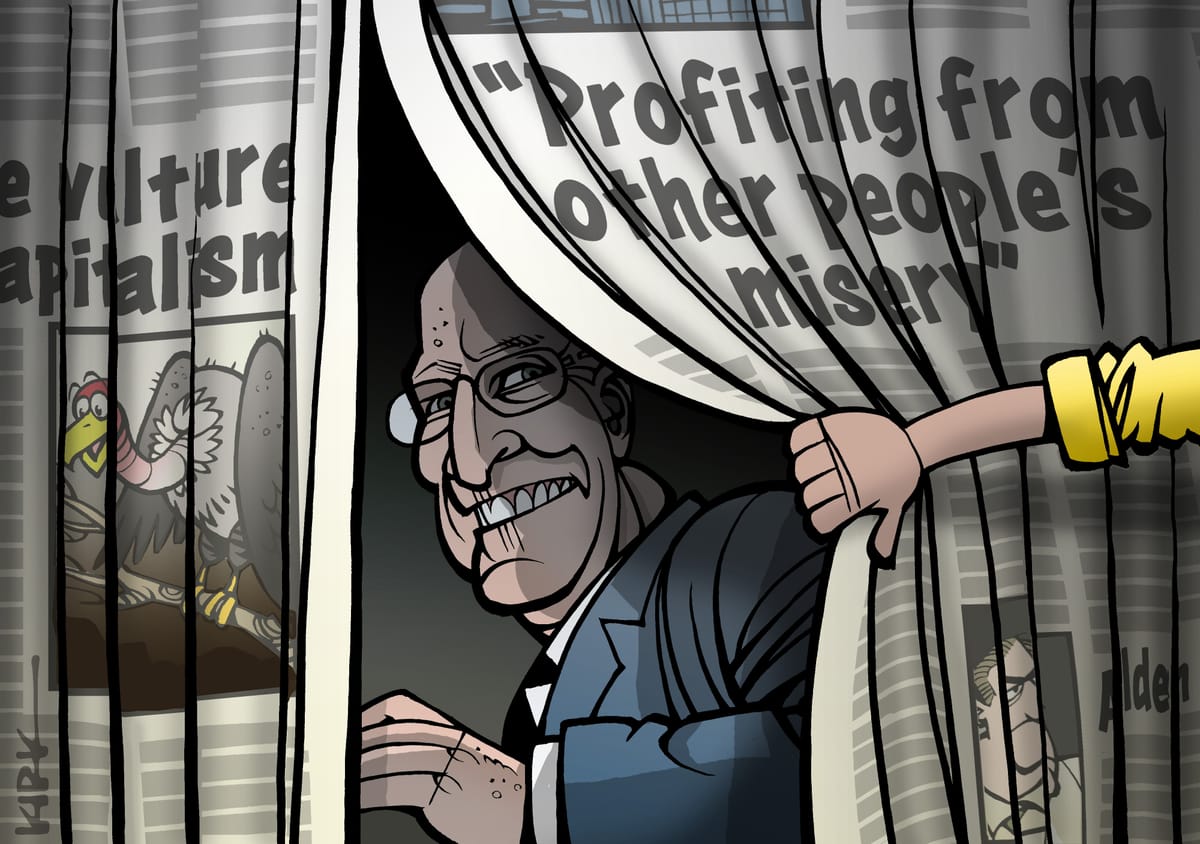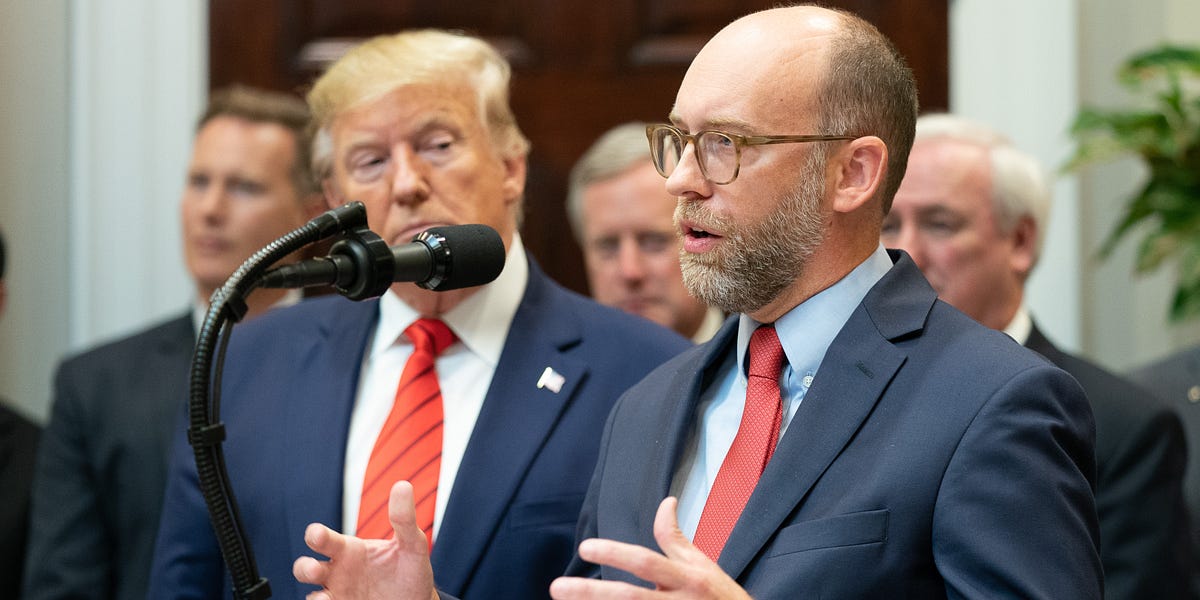A Hedge Fund’s Grip on Local News
New PBS documentary explains how Alden Global Capital gutted newspapers — and what we can still save

Stripped for Parts: American Journalism on the Brink is a new PBS documentary about what happens when hedge funds take over local news. Directed by Oscar-nominated filmmaker Rick Goldsmith, who conceived of the idea after a conversation with the legendary Bill Moyers, the film follows reporters in Baltimore, Chicago, Denver and the Bay Area as they resist Alden Global Capital’s slash-and-burn tactics and try to build something new from the wreckage.
Alden has spent the past 15 years buying up newspapers, gutting their staff, selling off assets and cashing out profits. The result is a series of ghost papers that carry the names of once-great institutions but no longer cover the communities they claim to serve.
Goldsmith’s cameras were there as journalists fought back — opinion editors writing searing editorials that got national attention, investigative reporters exposing Alden’s plans and industry veterans risking their jobs with a public plea for different ownership. Out of that defiance came nonprofit experiments and other innovative models, proving that journalists would rather build new outlets than watch their profession die.
The film also connects these newsroom rebellions to a wider fight. My colleague Mike Rispoli and Free Press board chairman Victor Pickard appear in the documentary, linking the collapse of local news to broader questions about the state of media and the greed of American capitalism. What’s happening is not a natural “digital disruption” but the result of financial takeovers and political choices that have harmed our democratic institutions.
That’s why the timing matters. Stripped for Parts will stream until the end of the year on PBS.org and the PBS app, with October broadcast dates to follow on many PBS affiliates. It lands just as public broadcasting itself has been stripped of federal funding and national outlets face mounting pressure from the Trump administration. The film is a warning that democracy will not survive if we keep treating journalism as another asset.
I connected with Goldsmith about why it took so long for the press to cover Alden, what surprised him most in making the film and what models might still save local journalism. Our exchange has been edited for length and clarity.
Julio Ricardo Varela: Why do you think the mainstream American public missed this story? Or did they miss the story?
Rick Goldsmith: Journalists are taught not to focus on their profession or industry. As 20th-century media critic George Seldes wrote, “The most sacred cow of the press is the press itself.” Some sharp-eyed journalists did cover the Alden Global Capital story as early as 2010, and starting in 2016, reporters Ken Doctor and Julie Reynolds began digging in depth.
Their investigations were read by journalists at Alden-owned newspapers. In March of 2018, The Denver Post suffered yet another round of layoffs (30 percent of the newsroom staff), and armed with those investigations, Denver Post editorial writer Chuck Plunkett knew what the problem was: This hedge fund had no interest in serious journalism to serve the Denver metropolitan area. He wrote a blistering editorial about Alden — unprecedented for a newspaper employee to blast his owner and employer. That editorial was picked up by the national news media — New York Times, Washington Post, CBS News, etc. The genie was out of the bottle. From that moment on, Alden Global Capital became known as a newspaper-destroying hedge fund.
JRV: What did you learn throughout the production of this documentary that surprised you?
RG: When I picked up the story in April 2018, the common wisdom was that Alden would bleed its newspapers dry, shutter them and walk away with the profits. What happened was worse. They kept going after more newspapers and newspaper chains: Gannett, the Tribune Company, Lee Enterprises and more. They had found their Golden Goose (the newspaper industry), and it kept producing golden eggs. That expanded the length of the story and led to a production that took five-and-a-half years.
JRV: How much is this Alden, and how much is this the newspaper industry missing the moment at the start of the Internet?
RG: Yes, the newspaper industry was slow to figure out how bad the new business environment of the 21st century was, and what to do about it. But the fact of the matter is that for almost 200 years, newspapers had discovered a business model, based on advertising as the chief revenue producer, that allowed them to both cover their communities and make tons of money.
This news, information and opinion vehicle became mostly a commodity, but still, in the best of circumstances, a public service. With the coming of Craigslist, the internet, the changing demographics and reading habits, Google and Facebook scarfing up the advertising dollars, etc., the business model collapsed. Regardless of how quickly the industry realized this, the business model wouldn’t ever return to 20th-century levels. But the new media barons are all hedge funds and private equity, and those outfits have no interest in journalism. They’re making all those newspapers (Chicago Tribune, Baltimore Sun, Orlando Sentinel) worse, and are just sucking them dry for the profits.
JRV: Do you think the local-newspaper industry will survive or is it too late?
RG: The newspaper industry, per se (meaning print newspapers), is effectively finished, especially for local news. There will be exceptions. But journalism, and especially local journalism, faces immense challenges. It needs to figure out how to cover communities with more limited resources, to adapt to the realities of new generations getting their news, information and fact-based opinion in different ways, and also — the elephant in the room — survive and thrive in the face of full-throated attacks by the current administration. And we all must figure out ways to support local journalism financially so it can be robust and powerful. At stake is the survival of democracy as we know it.
This is not an industry problem. This is a society problem. How do we make vibrant and well-supported this essential service that is the lifeblood of democracy?
JRV: What do you think is the model moving forward for local journalism?
RG: Everything is experimental right now. Let 1,000 flowers bloom. Nonprofit startups, collaborative efforts across different media — such as partnerships between public-radio stations and digital newsrooms — news organizations that specialize in one area, like the Texas Tribune and CalMatters, focusing on statehouse issues, or others on education, or climate change, etc. And what we’re starting to see all over the country is a move toward public-service journalism, recognizing that journalism, at its best, is a public service, and should be treated as such, and not as a commodity.
How to watch Stripped for Parts
Streaming: From Oct. 1 until Dec. 31, the film is available for free at PBS.org or on the PBS app through Apple TV, Google Play, Roku or most smart TVs
Broadcast: The film’s website has dates and times. You can also check your local listings. On Oct. 20 at 5 p.m. PT/8 p.m. ET, PBS World Channel will broadcast it everywhere (with repeat viewings).
Updates and highlights curated by the Pressing Issues team
Teamwork
Free Press’ Nora Benavidez appeared on Democracy Now! on Friday morning to discuss the imminent and heartbreaking deportation to El Salvador of journalist Mario Guevara, who has been transferred to an ICE facility in Louisiana after being held for more than 100 days, largely in solitary confinement. He was seized on June 14 while filming a No Kings rally in a suburb of Atlanta. “It is because of his journalistic work that they targeted him,” Nora told Amy Goodman. “The government has tried to make this case an immigration case. I always try to remind people this is a free-speech case. This is a press-freedom case. This is about the government not wanting reporting about what it is doing.”

Open tabs
We're listening to this conversation between podcaster Matthew Sheffield and Professor Don Moynihan about the federal government shutdown and the dangerous ambitions of its architect, Office of Management and Budget Director and Project 2025 mastermind Russell Vought.

The New York Times ran a long profile you should read on Vought’s plans, but Sheffield argues that it downplayed or missed important connections between Vought’s white Christian-nationalist views and his stated desire to force America to “understand the reality that it has to obey God.”
There’s also a larger story of the media's failure during the last election to expose Trump’s ties to the deeply unpopular Project 2025. Endless coverage echoed Trump’s lies distancing himself from the extremist plans even as he plotted to put Vought, Project 2025 co-author Brendan Carr and so many others in power.
Apple has caved to pressure from the Trump administration and is removing ICEBlock, the popular app tracking the movement of masked government agents in U.S. cities. It's worth noting just how heavily invested ICE is in tracking your phone and how you use it.
According to ICE documents that reporter Joseph Cox of 404 Media uncovered, the agency “has bought access to a surveillance tool that is updated every day with billions of pieces of location data from hundreds of millions of mobile phones.”

“The documents explicitly show that ICE is choosing this product over others offered by the contractor’s competitors,” Cox writes, “because it gives ICE essentially an ‘all-in-one’ tool for searching both masses of location data and information taken from social media. The documents also show that ICE is planning to once again use location data remotely harvested from people’s smartphones after previously saying it had stopped the practice.”
The kicker
“It took 20 years to go from Dan Rather to Bari Weiss.” — Marcy Wheeler, @emptywheel.bsky.social, reacting to reports that CBS News has made Weiss its top editor.
About the author
Julio Ricardo Varela is the senior producer and strategist at Free Press. He is also a working journalist, columnist and nonprofit-media leader. He is a massive Red Sox, Knicks and Arsenal fan (what a combo). Follow him on Bluesky.








